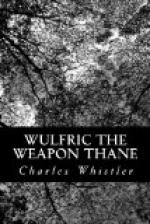And he held out his hand for the Dane to kiss, after our custom. But Lodbrok grasped and shook it heartily, saying:
“Thanks, Lord King, for that remembrance, and maybe also for a little forgetfulness.”
Nor was Eadmund displeased with the freedom, but at that last saying he laughed outright.
“Kings have both to remember and forget,” he said, “and maybe, if the citizens had not expected you to behave as wild vikings, you would have gone peacefully as you came?”
“That is the truth,” said Lodbrok.
So I suppose there had been some fray, of little moment, with the London folk.
Then we followed the king into the hall; and Lodbrok and I together sat at table over against him. Soon I knew all that an hour or two of pleasant talk would teach me of his home and sons and sports, and the king asked now and again of Danish customs, not yet speaking of the voyage.
“For,” said he, “it is ill recalling hardships until the feast is over. Then may one enjoy the telling.”
Presently the gleemen sang to us; and after that the harp went round, that those who could might sing, and all the talk in hall was hushed to hear Eadmund himself, the men setting down ale cups and knives to listen, for he had a wondrously sweet voice, and sang from the ancient songs of Caedmon {iv}. Then I sang of the sea—some song I had made and was proud of, and it pleased all. And at length we looked at Lodbrok, wondering if he could take his turn.
“Fain would I try to please my host,” he said, looking a little wistfully at my father; “but a man swept far from home against his will is no singer.”
Then Eadmund pitied him, as did we all, and rose up.
“Feasting is over, thanes,” he said. “Let us sit awhile in the other chamber and hear Lodbrok’s story.”
For he would ever leave the hall as at this time, so that the housecarles and lesser guests might have greater freedom of talk when we were gone.
So we rose up, and as we did so I saw Beorn, the falconer, look sourly at Lodbrok; and it misliked me that he should harbour any ill will even yet against the Dane who had done him no wrong.
Round the fire we sat; some ten of us in all, for Bishop Humbert and his folk went to their lodgings in the town, and there Lodbrok told the king of his voyage.
And when he named his sons, Eadmund looked grave, and said:
“I have heard of those two chiefs, Ingvar and Hubba. Did they not make a raid into Northumbria two years ago? Maybe they are yet there with the host.”
“Aye,” answered Lodbrok, seeming to wonder at the grave face of our king; “they went to Northumbria with the host that is yet there. They fought well and bravely at the place men call Streoneshalch {v}, gaining much booty. And it was by Ingvar’s plan that the place was taken, and that was well done. But they left the host with their men after that, saying that there were over many leaders already.”




